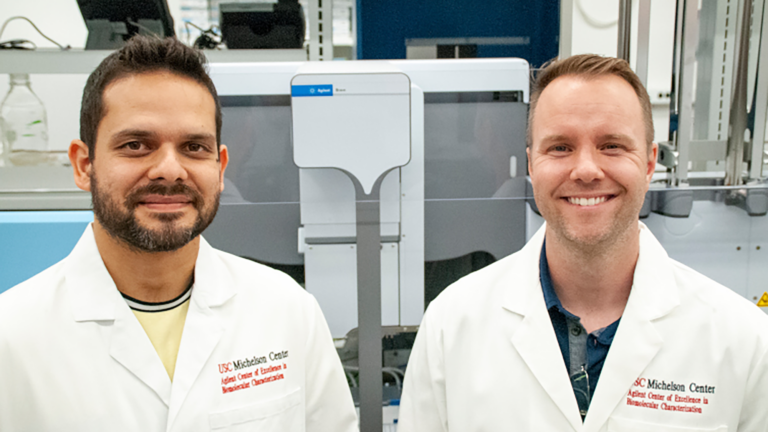
Introducing the latest Agilent Fellows, Dr. Alessandro Coradini and Dr. Matthew Sarnowski
Since 2018, the USC Michelson Center for Convergent Bioscience has maintained a partnership with Agilent Technologies that has allowed scientists to conduct cutting edge research using advanced analytical instrumentation to tackle challenges in life sciences. Through this partnership, two postdoctoral researchers, Dr. Alessandro Coradini (Molecular and Computational Biology) and Dr. Matthew Sarnowski (Chemistry), have been selected for the Agilent Fellows Program, which provides support for two years of postdoctoral research.
An Agilent Fellowship is a distinct honor as it is awarded to scientists who have already demonstrated impact through their laboratory work in biosciences or engineering as well as potential for career excellence in academia or private sector research.
Meet the Fellows

Dr. Coradini using liquid handling robots to extract DNA in the USC Agilent Center of Excellence in Biomolecular Characterization
Alessandro Coradini earned his Ph.D. in Science and Bioenergy from the University of Campinas (UNICAMP) in Sao Paulo, Brazil, in 2019. His current synthetic biology research builds on his previous postdoctoral work using yeast as a model in chromosome synthesis. As he explains, “minimal organisms are like a blank page, so you can add genes to them to produce chemical pathways.” Minimizing a eukaryotic cell for the first time is of particular significance to the goals of the Agilent—USC partnership as these cells are much closer to those found in humans than previously synthesized minimal bacterial cells. Dr. Coradini’s methodology therefore has strong potential to deepen knowledge of the human genome. The purpose of producing such minimal cells is not only to facilitate study of DNA but also to engineer new biotechnologies aimed at treatment and prevention of disease. Alessandro notes that chromosome synthesis, including his own project of synthesizing the first minimal eukaryotic chromosome from chemically synthesized oligonucleotides or DNA, is a rapidly growing field and offers the ability to make significant impact on global health through research and innovation.

Dr. Sarnowski analyzing protein samples using advanced mass spectrometry instruments in the USC Agilent Center of Excellence in Biomolecular Characterization
Matt Sarnowski earned his Ph.D. in Organic Chemistry from the University of Notre Dame in 2021. His current projects supported by the fellowship are indicative of his continuing interest in disrupting the buildup of amyloid proteins, which kill neurons in the human brain and thereby lead to neurodegenerative diseases, such as Chronic Traumatic Encephalopathy (CTE) and Parkinson’s. “I consider myself a peptide chemist,” he remarks while also noting that his interests align with the ongoing work of the Pratt Lab at USC. Matt’s expertise in peptide synthesis is applied to his work preparing O-GlcNAc modified variants of the presynaptic neuronal protein, α-synuclein, and then determining the effects of this posttranslational modification on protein aggregation kinetics. Additional collaboration with the Siemer Lab at USC allows him to conduct NMR-analysis of modified α-synuclein fibers and gain insight into their core structures. Going forward, Dr. Sarnowski intends to streamline the process of developing oral pharmaceuticals to ensure widespread access to effective medications for the treatment of neurodegenerative diseases.
Catalyzing careers through sponsorship and collaboration
Both scientists are interested in pursuing industry careers after completion of their two-year positions. They are poised for success toward these goals in part due to the Agilent Fellowship Program, which grants access to high quality laboratory resources at the Agilent Center of Excellence in Biomolecular Characterization. Dr. Coradini’s work is made possible through the use of two liquid handling robots that simultaneously extract DNA from many samples as well as mix solutions, while Dr. Sarnowski’s use of advanced mass spectrometry instruments allows him to visualize the outcomes of protein modifications. The program also provides global and local professional networking as awardees may attend events such as the Agilent Global Partner Universities Academic Drug Discovery Virtual Symposium as well as form relationships with Agilent Labs scientists. Alessandro and Matt acknowledge the strong support of their mentors, Dr. Ian Ehrenreich and Dr. Matt Pratt, respectively; and when asked if they would offer any advice to prospective applicants to the Agilent Fellowship Program, both emphasized that one should apply without hesitation as the experience will undoubtedly be a catalyst for their careers and increase the impact of their hard work thus far. The Agilent Fellows Program is now accepting postdoctoral applications for 2023.